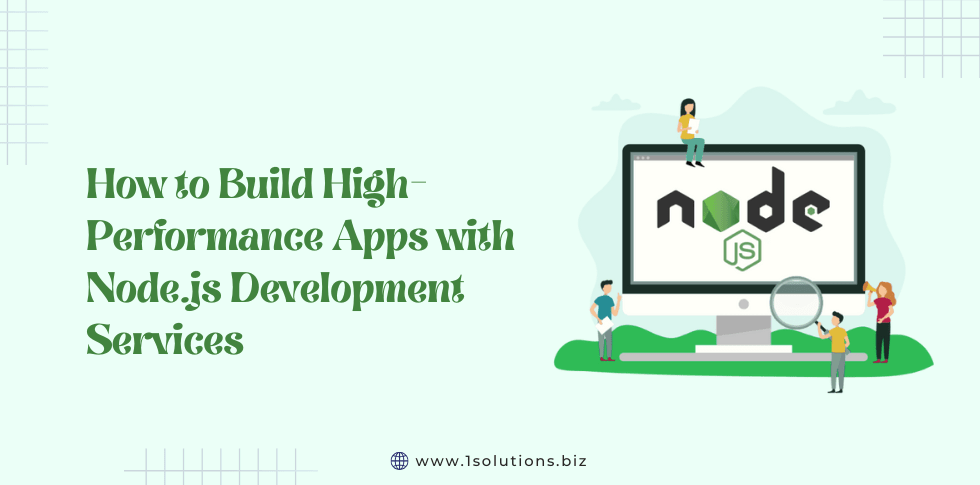Node.js has become the platform of choice for enterprises that demand speed, scalability, and developer productivity.
For organizations evaluating modern stacks, engaging professional Node.js development services can accelerate time-to-market while ensuring architectural robustness.
This article provides an operational playbook for building high-performance apps using Node.js, aligning development practices with business outcomes.
Node.js is uniquely positioned for web application development that requires concurrent connections and real-time data processing.
Its event-driven, non-blocking I/O model reduces latency and improves throughput for I/O-bound workloads.
When combined with disciplined engineering practices, Node.js enables teams to deliver scalable apps that maintain efficiency under load.
Why Choose Node.js for High-Performance Apps?
Organizations increasingly adopt Node.js as their go-to platform for modern, scalable, and real-time applications. Its technical design and ecosystem deliver both operational efficiency and business value.
Key reasons include:
- Event-Driven, Non-Blocking Architecture
- Handles thousands of concurrent requests without blocking the event loop.
- Reduces latency and improves throughput, especially for I/O-heavy applications.
- Real-Time Capabilities
- Optimized for use cases like chat applications, collaboration platforms, and streaming services.
- Ensures low-latency data exchange, critical for high-engagement user experiences.
- Unified JavaScript Stack
- Enables developers to use a single language (JavaScript) across both frontend and backend.
- Simplifies hiring, training, and knowledge transfer while improving developer velocity.
- Cloud-Native Compatibility
- Seamlessly integrates with container orchestration (Kubernetes, Docker) and serverless environments.
- Supports elastic scaling in modern cloud infrastructures.
- High Developer Productivity
- An extensive npm ecosystem accelerates development with pre-built modules and libraries.
- Promotes rapid prototyping and faster release cycles.
- Cost Efficiency
- Lightweight runtime optimizes infrastructure usage.
- Reduces server resource consumption compared to traditional multi-threaded platforms.
- Proven Enterprise Adoption
- Widely used by leading global companies (e.g., Netflix, LinkedIn, PayPal) for mission-critical applications.
- Validates Node.js as a stable, mature, and enterprise-ready platform.
Also Read: 7 Best Free AI Website Builders in 2025
Key Features of Node.js for App Development
Node.js offers a robust set of technical features that directly enhance application performance, scalability, and maintainability. Its architecture and ecosystem make it an ideal choice for enterprises building modern, high-performance applications.
Core features include:
- Single-Threaded Event Loop
- Efficiently manages I/O-heavy operations without spawning multiple threads.
- Delivers high concurrency and responsiveness, ideal for applications with thousands of simultaneous connections.
- High-Speed JavaScript Execution (Powered by V8 Engine)
- Ensures rapid code execution with optimized performance.
- Reduces latency, making Node.js particularly effective for real-time and data-intensive applications.
- Streaming Support for Memory Efficiency
- Processes data incrementally rather than loading entire payloads into memory.
- Improves throughput for use cases such as video streaming, file uploads, and large-scale data transfers.
- Expansive Open-Source Ecosystem
- Access to a vast library of npm packages accelerates development cycles.
- Promotes component reuse, reducing time spent on repetitive engineering tasks.
- Native JSON Handling
- Enables fast and seamless API integration.
- Simplifies real-time data interchange between servers, clients, and databases.
- Microservices-Ready Architecture
- Lightweight process management and IPC (Inter-Process Communication) support make it ideal for distributed systems.
- Encourages modular development, enabling teams to scale services independently.
These features make Node.js a strategic enabler for businesses aiming to launch scalable applications with rapid release cycles.
Developers can prototype quickly, iterate on APIs efficiently, and deploy updates with minimal operational friction.
For organizations looking to maximize these advantages, engaging skilled professionals is critical. By choosing to hire dedicated web developer resources, companies gain access to expertise that ensures Node.js applications are architected for performance, resilience, and long-term scalability.
Benefits of Using Node.js Development Services
If you’re thinking about whether Node.js is right for your next project, here are the top benefits of using Node.js development services:
1. High Performance and Speed
Node.js uses Google’s V8 engine, which compiles JavaScript directly into machine code. This makes apps run extremely fast. With its non-blocking, event-driven architecture, Node.js handles multiple requests at once without slowing down.
2. Scalability for Growing Businesses
One of the biggest reasons companies use Node.js is scalability. It supports horizontal scaling (adding more servers) and vertical scaling (adding more resources to existing servers). Whether you’re running a startup app or a large enterprise platform, Node.js can handle growing traffic smoothly.
3. Full-Stack JavaScript Development
With Node.js, developers can use JavaScript for both frontend and backend. This means:
- Faster development cycles
- Reduced the need for multiple programming languages
- Better collaboration between teams
4. Cost-Effective Development
Because Node.js allows the same language across the stack, businesses save money on hiring separate frontend and backend teams. Development becomes faster and more efficient, lowering overall project costs.
5. Large and Active Community
Node.js has one of the largest open-source communities. Developers can access countless modules, tools, and libraries via npm (Node Package Manager). This speeds up development and ensures reliable solutions for common challenges.
6. Real-Time Capabilities
For apps like chat systems, live dashboards, gaming, or video streaming, Node.js is the perfect fit. Its WebSockets support enables two-way communication, allowing real-time updates without delays.
7. Strong Support for Microservices
Modern applications often rely on microservices for flexibility. Node.js is well-suited for building a microservices architecture, which helps businesses:
- Break apps into smaller, manageable modules
- Scale individual services independently
- Improve performance and fault tolerance
8. Cross-Platform Development
Node.js supports cross-platform frameworks like Electron and NW.js, which allow developers to build desktop applications using the same codebase. This reduces time-to-market and boosts efficiency.
9. Better Productivity and Faster Time-to-Market
Using a single language (JavaScript), pre-built npm packages, and real-time features means developers can build and deploy apps faster. This reduces time-to-market, giving businesses a competitive advantage.
10. Improved Maintenance and Updates
With a modular architecture, Node.js makes it easy to update, maintain, and add new features without disrupting the entire system. Businesses benefit from smoother long-term operations.
11. Enhanced Security Options
Security is always a top concern. Node.js has built-in security features, and developers can enhance protection with tools like:
- Helmet.js for secure HTTP headers
- npm audit for vulnerability checks
- Regular security patches from the Node.js community
12. Backed by Industry Leaders
Some of the world’s top companies, like Netflix, PayPal, LinkedIn, and Uber, rely on Node.js. Choosing Node.js development services means using a technology trusted by global brands handling millions of users daily.
Node.js development services bring together speed, scalability, cost savings, and flexibility, making them a top choice for startups and enterprises alike. Whether you need a real-time chat app, e-commerce platform, or enterprise solution, Node.js provides the foundation for building high-performing, future-ready applications.
Best Practices for Building High-Performance Apps with Node.js
Node.js has become one of the top choices for building fast, scalable, and modern web applications. Its event-driven architecture and non-blocking I/O make it ideal for high-performance apps. But to get the most out of Node.js, developers need to follow proven best practices.
Here are the top best practices you should follow to ensure your Node.js apps perform at their best:
1. Use Asynchronous APIs Wherever Possible
One of the biggest advantages of Node.js is its non-blocking, asynchronous nature. Always prefer asynchronous methods over synchronous ones to avoid blocking the event loop.
Example: Use fs.readFile() instead of fs.readFileSync().
2. Keep the Event Loop Free
A blocked event loop slows down the entire application. Avoid heavy computations directly in the main thread. If you need CPU-intensive tasks, offload them using:
- Worker Threads
- Child Processes
This ensures the event loop remains responsive.
3. Use Caching Strategically
Caching can speed up responses significantly. Common approaches include:
- In-memory caching with Redis or Memcached
- HTTP caching with proper headers
- Application-level caching for frequently accessed data
4. Optimize Middleware Usage
Avoid stacking too many middlewares in frameworks like Express.js. Only include what’s necessary. Also, consider lightweight alternatives like Fastify for better performance.
5. Apply Proper Error Handling
Poor error handling can crash your app. Always:
- Use try…catch blocks for async/await
- Handle promise rejections (.catch())
- Set up global error handlers with process.on(‘uncaughtException’) and process.on(‘unhandledRejection’)
6. Use a Reverse Proxy like Nginx
Nginx or HAProxy in front of your Node.js app can:
- Handle SSL termination
- Balance traffic between multiple instances
- Serve static assets faster
7. Implement Horizontal Scaling with Clustering
By default, Node.js runs on a single core. Use the cluster module or process managers like PM2 to run multiple instances across CPU cores.
8. Monitor and Optimize Memory Usage
Memory leaks can kill performance. Use tools like:
- Node.js built-in heap snapshots
- clinic.js
- New Relic or Datadog for monitoring in production
9. Minimize Dependencies
Every dependency adds potential overhead and security risks. Use only trusted, well-maintained packages. Regularly run npm audit and keep packages updated.
10. Use Environment-Based Configurations
Never hardcode configurations. Use .env files with libraries like dotenv. This ensures:
- Better maintainability
- Easier scaling between development, staging, and production
11. Secure Your Application
Performance is useless without security. Basic best practices include:
- Using Helmet for setting HTTP headers
- Avoiding eval() and unsafe code execution
- Validating user input with libraries like Joi
12. Profile and Benchmark Regularly
Don’t wait until users complain. Use tools like:
- Node.js Performance Hooks
- Autocannon for load testing
- Chrome DevTools for profiling server-side code
13. Optimize Database Queries
Databases are often the bottleneck. To improve efficiency:
- Use indexes wisely
- Apply connection pooling
- Use ORMs carefully (or prefer raw queries for performance-critical paths)
14. Serve Static Files via CDN
Don’t overload your Node.js server with static content. Use a Content Delivery Network (CDN) like Cloudflare or AWS CloudFront to handle images, CSS, and JavaScript files.
15. Use Logging and Monitoring Tools
Track app performance and detect issues before they escalate. Tools like:
- Winston or Pino for logging
- ELK Stack (Elasticsearch, Logstash, Kibana) for analysis
- Grafana + Prometheus for real-time metrics
Building high-performance apps with Node.js is not just about writing JavaScript—it’s about following the right practices from day one. By keeping the event loop unblocked, using caching, scaling properly, and monitoring performance, you can ensure your Node.js application is fast, stable, and ready to handle growth.
How to Hire the Right Team for Node.js Development
Building high-performance applications with Node.js requires more than familiarity with the platform demands the right mix of technical expertise, delivery capability, and cultural alignment.
Choosing the right team is therefore a strategic decision that influences not only delivery timelines but also long-term product scalability, reliability, and innovation capacity.
Key Evaluation Criteria for Hiring Node.js Talent
- Proven Node.js Expertise
- Seek developers with hands-on experience across the Node.js ecosystem, including asynchronous programming patterns, non-blocking I/O handling, and event loop management.
- A strong understanding of V8 engine internals and Node.js performance tuning ensures that applications can be optimized for speed and efficiency.
- Production Deployment Experience
- Candidates or vendors should demonstrate a track record of building and deploying production-grade applications at scale.
- Look for expertise in microservices architectures, containerization (Docker, Kubernetes), and serverless patterns-all of which are critical for building modern, cloud-native applications.
- DevOps and CI/CD Proficiency
- Node.js applications thrive when integrated with robust CI/CD pipelines.
- Ensure candidates are familiar with automated deployment practices, infrastructure as code (IaC), and observability stacks (logging, monitoring, and tracing). These capabilities enable continuous delivery with reduced downtime.
- Testing and Quality Assurance Discipline
- Effective teams emphasize automated testing (unit, integration, end-to-end) and enforce strict code quality standards.
- Experience with load testing tools (e.g., k6, Artillery, Gatling) and profiling ensures applications can scale predictably under target SLAs.
- Cross-Functional Capabilities
- The most effective delivery models are not siloed. Prioritize teams that include backend developers, DevOps engineers, QA automation specialists, and Site Reliability Engineers (SREs).
- Cross-functional collaboration shortens feedback loops, reduces rework, and ensures smoother transitions from development to production.
Strategic Considerations for Enterprises
- Cultural Fit and Communication Skills
- Beyond technical ability, teams must align with organizational culture and communication practices.
- This ensures effective collaboration, especially in distributed or hybrid team environments.
- Domain Knowledge
- Teams with prior experience in your industry vertical (e.g., fintech, healthcare, e-commerce) can accelerate delivery by applying domain-specific best practices and avoiding common pitfalls.
- Scalability of Engagement
- Consider whether you require a project-based vendor, a long-term development partner, or embedded resources.
- For sustained delivery capacity, many organizations choose to hire dedicated web developer resources who integrate directly with internal teams and drive ongoing innovation.
- Proven Delivery Methodology
- A mature vendor will follow agile delivery practices, incorporate continuous feedback loops, and embed performance and security testing at every stage of the lifecycle.
Hiring the right Node.js development team is an investment in long-term product success. The best teams bring not only technical mastery but also operational maturity and a collaborative mindset.
By carefully evaluating expertise, deployment track record, DevOps readiness, and cross-functional depth, organizations can secure partners who will deliver resilient, scalable applications aligned with strategic business goals.
Also Read: WordPress Alternatives To Build Your Website
Frequently Asked Questions
1. Why is Node.js ideal for building high-performance apps?
Node.js uses an event-driven, non-blocking architecture powered by the V8 engine. This makes it fast, scalable, and capable of handling thousands of concurrent connections with low latency.
2. What types of applications are best suited for Node.js?
Node.js is perfect for real-time applications like chat platforms, streaming services, collaboration tools, gaming apps, and scalable e-commerce platforms.
3. How does Node.js help businesses scale their applications?
Node.js supports vertical and horizontal scaling, enabling businesses to easily add resources or expand across multiple servers to handle growing traffic smoothly.
4. Is Node.js cost-effective for startups and enterprises?
Yes. Node.js enables full-stack JavaScript development, reducing the need for multiple specialized teams and lowering overall project costs while speeding up delivery.
5. How secure are applications built with Node.js?
With built-in security features and tools like Helmet.js and npm audit, plus best practices from professional developers, Node.js applications can be both fast and secure.
6. Can Node.js handle enterprise-level projects?
Absolutely. Global enterprises like Netflix, PayPal, and LinkedIn use Node.js for mission-critical applications, proving its maturity and scalability for large-scale deployments.
7. Why hire professional Node.js development services?
Expert Node.js developers bring enterprise-grade expertise, faster time to market, scalable systems, and reduced risks, ensuring your apps are built for long-term success.
Take Away
Node.js remains a cornerstone technology for teams building high-performance, scalable apps. Its continued maturation and robust community support make it a pragmatic choice for modern web application development.
By coupling Node.js with disciplined engineering practices and professional Node.js services, organizations can achieve optimal performance while maintaining agility.
For enterprises looking to leverage Node.js expertise, 1Solutions offers end-to-end Node.js development services.
From custom application design to long-term support, 1Solutions helps organizations build future-ready apps that deliver both performance and business value.






























